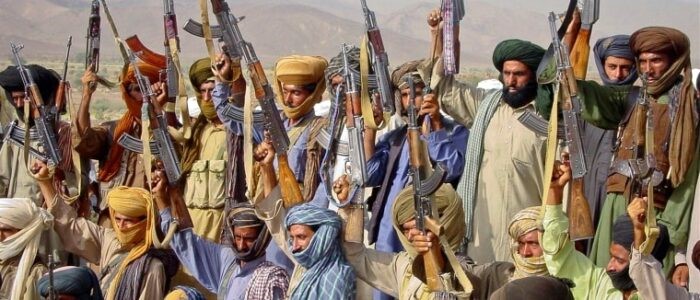
Sir Walter Raleigh, an English navigator and poet, who lived in the mid-1500s, sentences: ‘He who dominates the sea dominates the commerce of the world, and to him who dominates commerce, belong all the treasures of the world and the world itself’[1] . The quotation sounds like a metaphor for Belucistan, a nation (struggling desperately and futilely for independence) on the brink of the abyss, which is little talked about and which plays a central role in world power games – because controlling Belucistan means controlling Iran, Afghanistan and Pakistan all at once.
Particularly in the Pakistani area, tensions result in violence, destruction, extreme poverty and serious human rights violations: the guerrilla warfare has been going on for almost 80 years, the government in Islamabad responds with mass executions. Intelligence agencies work alongside militias, death squads and religious groups to arrest, forcibly detain and disappear as many Belucian intellectuals, activists and political figures as possible[2] . In the crosshairs is anyone who opposes the Indian Independence Act of 1947, which, in order to make room for Muslims fleeing free India, denied the Belucians a homeland.
To the fury of the Pakistani invaders, the Beluchis respond with equal violence. The conflict is unlikely to be resolved in the near future: the interests at stake are enormous and the mechanisms extremely complex and destabilising. Belucistan is a region rich in natural resources: the unexplored deposits in Pakistani Belucistan alone are estimated at 310 million barrels of oil, plus almost a billion cubic metres of natural gas reserves, 2.2 billion tonnes of coal reserves, for a production capacity of 15 thousand tonnes per day. There are also very rich deposits: the Rekodiq copper and gold mine alone is valued at USD 260 billion and has reserves of at least 6 billion tonnes – it is the fourth largest deposit in the world[3] .
Despite the natural riches, a large part of the province’s population lives below the poverty line, only 41% of the population is literate, the unemployment rate is around 30%, and only 7% have access to running water. And despite the fact that one third of Pakistan’s natural gas is extracted from Belucistan, only very few Belucian cities are connected to the supply network[4] . Realities that, when added to the unequal employment and social treatment and the violence of Pakistanis everywhere, obviously generate anger[5] .
Geostrategic monsters
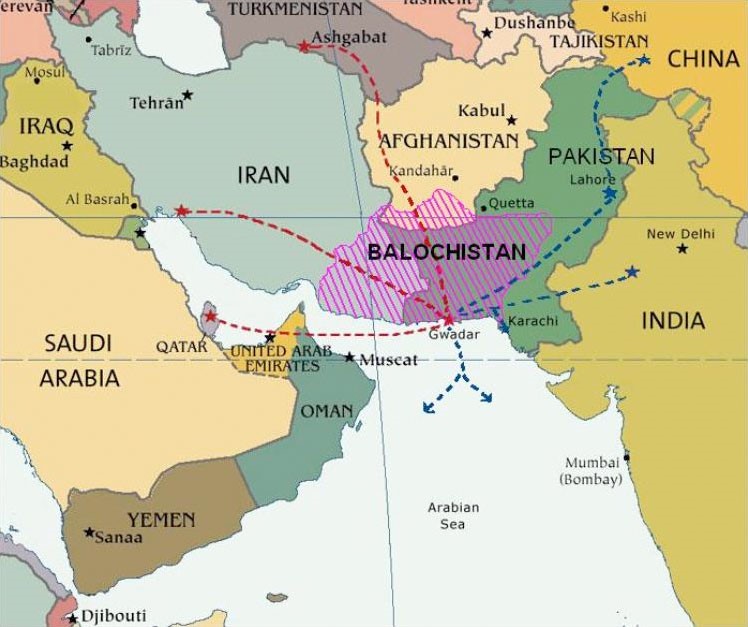
Balochistan is the central hub between China, Central Asia, West Asia and the Arabian Sea[6]
With an area of 530,000 km² (larger than Spain), Belucistan is a mountainous and arid region: in the eastern, central and northern parts of the province, some of the mountains exceed 2300 metres, while the plains are about 1500 metres above sea level. It is located in the south-eastern part of the Iranian plateau, straddling the Pakistani region of Belucistan, the Iranian province of Sistan and Belucistan, and the southern regions of Afghanistan. In these areas of hostile nature, the population density is very low, just over 21 million people live[7] , divided into 55.7 per cent Beluci and 36 per cent Pashtun, with the remaining 8 per cent made up of smaller communities. In addition to the Beluci language, Pashto, Persian and Brahui are also spoken among them.
It is a key country for global logistics: the routes of key energy-producing countries such as Saudi Arabia, Iran, Iraq, Qatar and the United Arab Emirates intersect here; more than 60 per cent of the world’s oil shipments, mostly from the Middle East to China, Japan or other Asian economies, pass through these waters, as do 70 per cent of containers travelling to the rest of the world[8] .
On the Afghan side, less than one million Beluci live in 24 provinces including Farah, Helmand, Kandahar and Herat, but the majority live in Nimroz, 900 km south-west of Kabul, close to the border between Afghanistan and Iran: here they have lived for centuries on the banks of the Helmand River, one of the country’s main water sources. In Iran, the Beluci live mainly in the province of Sistan and Iranian Belucistan, the second largest of the country’s 31 provinces, but also to a lesser extent in the provinces of Kerman, Hormozgan and South Khorasan. Over 4.8 million Beluchis live in these five provinces, 5.51% of Iran’s total population. In Pakistan, on the other hand, more than 70% of the Belucians reside – almost 13 million, or 5% of the national population; they live in the Pakistani province of Belucistan, an area of almost 350,000 km² – 44% of Pakistani territory; Quetta, besides being the capital, is also an important trade and communication centre[9] . The subsoil, rich in natural gas reserves – over 40% of Pakistan’s total production – has some of the world’s largest reserves of copper, gold and oil[10] .
The history of Belucistan’s insurgency originates in its forced integration into Pakistan in 1948. Before partition, the British administered the Beluchis on the Afghan-Pakistani border with the ‘Sandeman system’, which institutionalised tribal councils and tribal taxes among the Beluchis, provided power to local hereditary chiefs and maintained control through financial incentives[11] . This system provides the Belucians with a great deal of autonomy.
The Indian Independence Act, passed on 18 July 1947, provides for the establishment of independent India and Pakistan and leaves all others two options: join one or the other state[12] . The Act provides that if a principality does not choose by 15 August 1947, it has the right to remain autonomous except in the management of defence, foreign affairs and communication, areas that would still be managed by the federal government[13] . And this is the path that Kalat, a constituent part of today’s Baloch state, takes: through a parliamentary procedure, Prince Mir Ahmedyar Khan declares independence. But Pakistan finds this unacceptable and, at the end of 1947, deploys the army to force the Khan of Kalat to sign the accession[14] .
The prince rebels
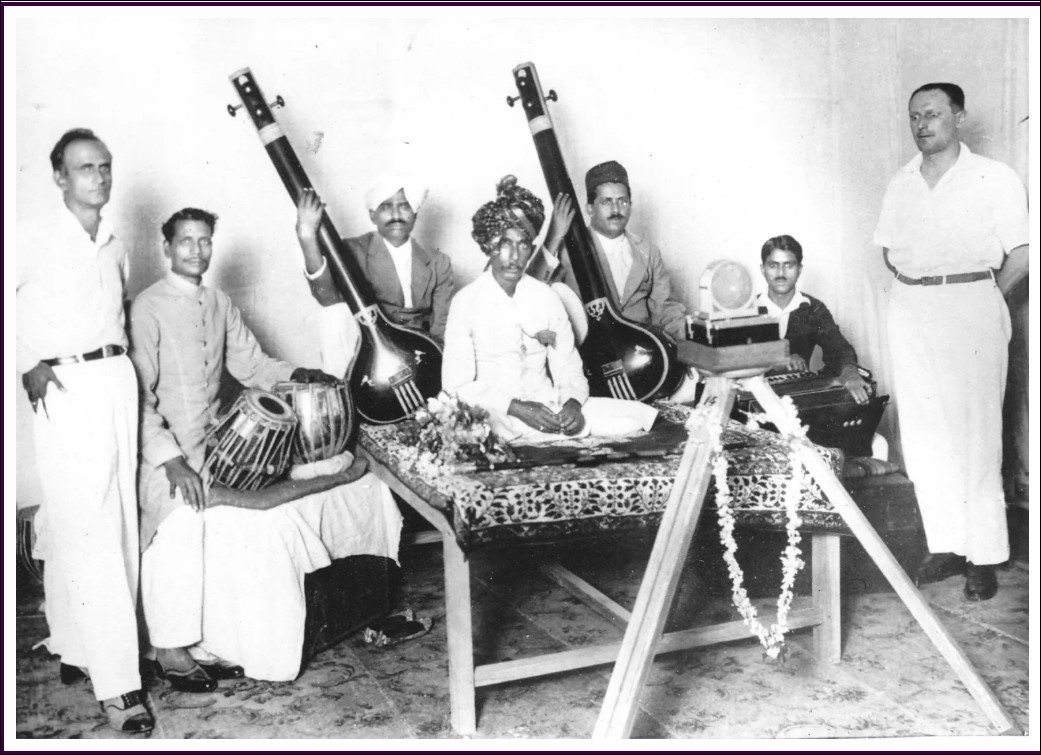
Kalat, 1936: Seated in the centre, Prince Abdul Karim (Kareem) Khan[15]
Belucistan became a province of Pakistan in June 1948, but Prince Abdul Kareem Khan, Mir Ahmedyar’s younger brother, rejected the annexation, claimed independence and fled to Afghanistan to seek alliances for the armed struggle, inciting prominent members of the Belucian nationalist political parties – the Kalat State National Party, the Baloch League and the Baloch National Workers Party – to join him in the struggle for the creation of an independent ‘Greater Balochistan’. He also launched a recruitment campaign: every person who recruits 100 men is offered the rank of major and every person who recruits 50 men becomes a captain[16] .
But things do not go as hoped: the Afghan authorities refuse to provide help – only the year before, Afghan rulers such as Shuja Shah and Abdur Rahman Khan were planning to occupy Belucistan and their position, which fully reflects Afghan expansionist aims, is one of absolute embarrassment; they also deny the rebel group the right to operate on Afghan soil, but offer the prince and his loyalists asylum as political refugees. The last hope for Kareem Khan is the Soviet embassy, but the diplomats, although they pay attention to the requests for help, remain passive: the Soviet government does not want to go against the Afghans and the British, both of whom are against the creation of an independent Belucistan[17] .
In the meantime, the Pakistani government outlaws the prince and his party, considering them rebels, and moves the army to the Afghan border. This was the beginning of the first wave of clashes: on 8 July 1948, during an organised insurrection in Pakistan in the Jhalawan area, Kareem Khan and 142 of his followers were arrested and imprisoned in Machh and Quetta prisons[18] . Several insurrection phases followed one another: after the first one in 1948, three more followed (1958, 1963-69, 1973-77) with increasing intensity, both in terms of the violence of the clashes and their geographical scope[19] . While the first insurrections did not obtain any particular participation, in the fourth insurrection of 1973, almost 55,000 Belucian rebels armed themselves to fight against the Pakistani and Iranian air force[20] .
The 1999 military coup that brought Pervez Musharraf to power in Pakistan[21] , increased the general alienation among the Belucians and paved the way for the fifth phase, the longest as well as the most violent of the previous ones, as the Afghan civil government gained full control of the country and many Taliban fighters fled to Belucistan, numerically marginalising the local population: Quetta, the provincial capital, became the de facto capital of al Qaeda and the Taliban in Pakistan. Moreover, the influx of extremist militants brings more federal army and paramilitary troops into the province, creating a hostile environment for Belucian nationalists[22] .
Not even the transition from the military government of Musharraf to the civilian government of Zadari in 2008 was able to stop the violence: in 2009 alone, 792 attacks were recorded, leaving 386 people dead, and 92% of the attacks were linked to the Beluchis[23] . In 2010, the attacks reach 730 and the dead will be 600[24] . The rebellion starts again in a crescendo in 2022: on 26 April Shari Baloch, the first female Belucian suicide bomber affiliated with the BLA[25] , enters the Confucius Institute of Karachi University and blows herself up, killing three Chinese teachers and a Pakistani driver[26] ; On 1 August, the BLA uses anti-aircraft guns to shoot down a Pakistani military helicopter, killing the six passengers[27] ; on Christmas Day, the BLA coordinates five bomb attacks in the cities of Turbat, Kahan, Gwadar and Quetta[28] , killing at least six Pakistani security personnel[29] .
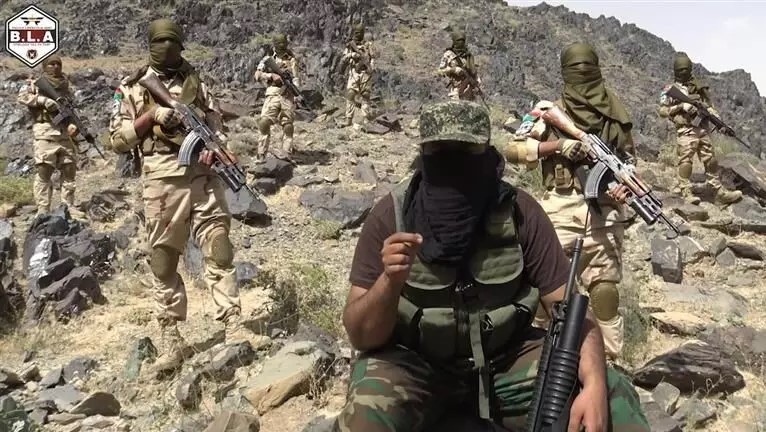
Separatists of the Belucistan Liberation Army (BLA), the most active and important in Pakistan[30]
In 2023, attacks follow one another with dramatic frequency: on 20 January, a bomb derails a passenger train in the Pakistani province of Belucistan injuring 13 people[31] ; on 6 March, a suicide attack kills 9 security officers[32] ; in Quetta, on 10 April, a double attack kills first two police officers and two civilians; a few hours later, another bomb explodes near a police vehicle seriously injuring four people[33] ; on 24 June, a female suicide bomber, Sumaiya Qalandrani[34] , kills a member of the police[35] . These attacks are confused with attacks that have never been claimed, or that have been claimed by other terrorist groups, as in the case of the massacre caused by a bomb that exploded on 30 January in a mosque in Peshawar, killing more than 100 people[36] .
The perpetrator of this latest attack is the Tehreek-e-Taliban Pakistan (TTP) group, which has nothing to do with the Belukistan liberation struggle: ideologically and strategically aligned with the Afghan Taliban, the TTP has been conducting an insurgency against the Pakistani state for more than a decade in order to assert Sharia law and, since it broke the peace agreements with the government in November 2022, has resumed sowing terror in the country[37] . Despite their different objectives, the suspicion that the TTP and the Belucians are starting to collaborate with each other is raised from many sides, several signs indicate that there is a real possibility that the Belucian and Pashtun insurgents will join forces: it is the TTP itself that claims that a group of fighters from Makran, in Belucistan, has joined them, and this would be a real nightmare for the government authorities[38] .
According to the Global Terrorism Index published by the Australian Institute for Economics and Peace, Pakistan – a region in which at least 44 rebel and terrorist groups coexist[39] – surpasses Afghanistan as the country with the highest number of terrorist attacks and deaths in South Asia: the number of victims represents the largest year-on-year increase in the last decade, 55% consisting of military personnel[40] . The Belucistan Liberation Army is believed to be responsible for 36% of terrorism-related deaths in Pakistan, a nine-fold increase over the previous year, making it the fastest growing terrorist group in the world, surpassing the TTP – historically one of the deadliest in the country – even in the ‘quality’ of targets: of the 233 deaths attributed to BLA in 2022, 95% involved military personnel[41] .
Preventing the Silk Road
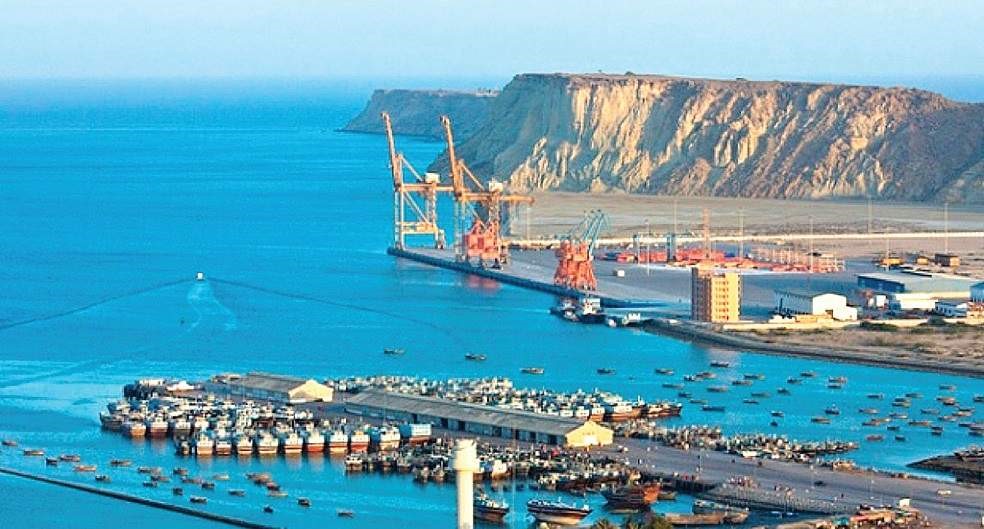
The port of Gwadar in Pakistan, a key project within the China-Pakistan Economic Corridor (CPEC)[42]
Since their forced annexation, the Beluchis have never stopped fighting, dreaming of their independence, and relations with Pakistan over the years have been deteriorating. It is not only harassment that fuels the struggle: in recent years, it is China that has been the common thread of the violence. In 2001[43] China announced the CPEC (China Pakistan Economic Corridor)[44] , an infrastructure project worth over 62 billion dollars – currently undergoing a major crisis[45] – connecting Kashgar in the province of Xinjiang – a particularly unstable region that suffers military repression by the national government in the same way as Belucistan[46] – to the Pakistani port of Gwadar, 2000 km away, the management of which is entrusted to the Chinese China Overseas Port Holding Company (COPHC)[47] under a 40-year contract signed with the Pakistani government in 2013.
It is a company with opaque characteristics to say the least, which does not present its annual accounts and does not disclose details of its corporate structure[48] . The CPEC is an integral part of the Belt and Road Initiative’s (also called Silk Road) global development strategy, and includes plans to build road, rail and oil pipeline links: it is Beijing’s way of trying to expand its power over Central and South Asia and counter American and Indian influence.
China then launches numerous construction sites employing thousands of Chinese people on the territory of Belucistan, and the separatists claim that Pakistan, with the intention of fostering Chinese expansion in the territory, is digging up the reserves of copper, gold, gas and coal in Belucistan through spasmodic exploitation, without any return for the Belucian people[49] . This is a shameless operation of Chinese imperialism: not only do the Belucians have no stake in it, but Pakistanis are also excluded from the design, engineering and implementation of CPEC’s major projects, thus also giving up a great opportunity for work, training and growth[50] .
But the project goes ahead with the blessing of Pakistan – which has a dream of curing its economic disaster by partnering with China and becoming a power capable of keeping neighbouring (hated) India at bay[51] . The Beluchis’ real concern that their land could become a Chinese colony, despoiled of its wealth and environmentally defaced, is therefore justified. The port of Gwadar, which provides an outlet to the Indian Ocean, is one of the major targets of the project, forcing 20,000 fishermen – 80 per cent of the 185,000 Belucians living in the district – to be displaced: there is no more room in the port for their landing places and the fishing economy could be literally wiped out[52] .
The land around Gwadar is being illegally sold by government officials who make massive profits at the expense of the Belucians, while a parallel city is being built for workers near the old one in order to isolate the Belucians from the increasing influx of foreigners[53] . The port of Gwadar is not only the target of the CPEC, but is also involved in the TAPI (Turkmenistan-Afghanistan-Pakistan-India) project, which envisages the construction of 1849 km of gas pipeline capable of transporting at least 33 billion cubic metres of natural gas per year from the Galkynysh field in Turkmenistan to Gadwar via Afghanistan[54] . There is therefore a new enemy to fight and a new war ensues, to which China responds by stirring up the Pakistani army itself against the Belucistan Liberation Groups[55] .
Only solution: for Pakistan to change its strategy
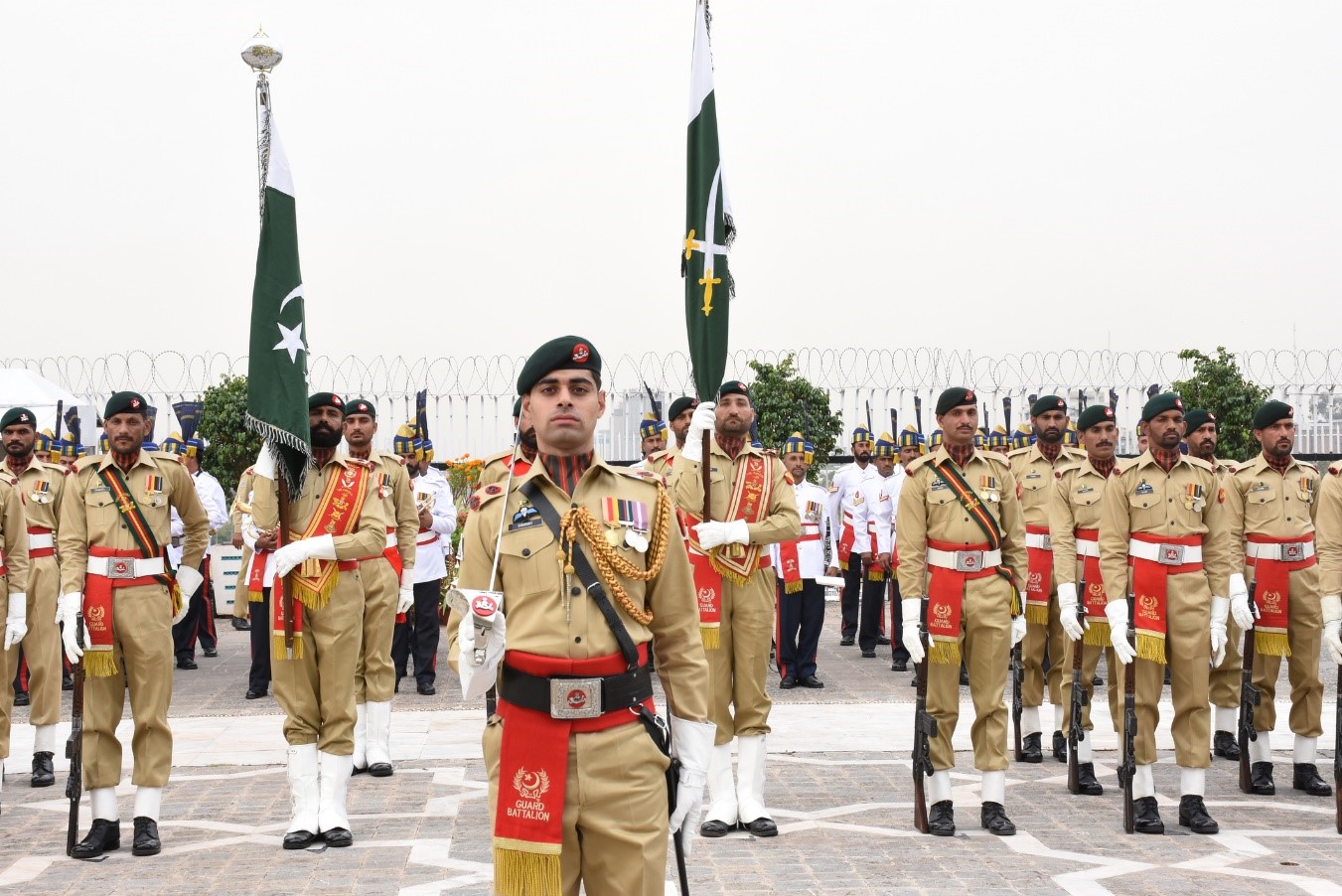
The army is an important economic player in Pakistan: it controls banks, real estate, industries[56]
The primary objective of the Belucian rebellion is not even independence, but the restoration of civil rights: the regaining of political participation, health, education, all rights denied by Pakistan and Iran, the cessation of violence and the right to participate in decisions concerning one’s own territory, above all the right to oppose foreign economic imperialism. Obtaining all this, of course, is the previous step to what is the real dream: the creation of a separate and autonomous state[57] .
Pakistan, for its part, cannot forget the terrible mistake it made with Bangladesh: in 1947 the newly formed state was a melting pot of numerous ethnic groups, Bengalis, Punjabis, Sindhis, Pashtuns and Beluchis. The ferocious repression of the Bengalis resulted in 3 million dead and several million displaced persons in little more than eight months[58] : before the Beluci insurgency results in a second Bangladesh, Pakistan should learn from its own history. The refusal of reconciliation drives the weakest to radical struggle. Having survived so many years of violence and repression, today the Belucistan army is in fact the third military front after the conflict with India over Kashmir and the one against radical Islamic militants.
The only possible way forward for Pakistan is to show greater respect for human rights in Belucistan by disbanding the death squads, stopping extrajudicial executions and putting an end to enforced disappearances. The very integrity of the country, already on the brink of a serious food crisis, torn apart by droughts and massive floods that in recent years have generated thousands of deaths, displaced millions, destroyed crops, infrastructure, and power plants, depends on it.
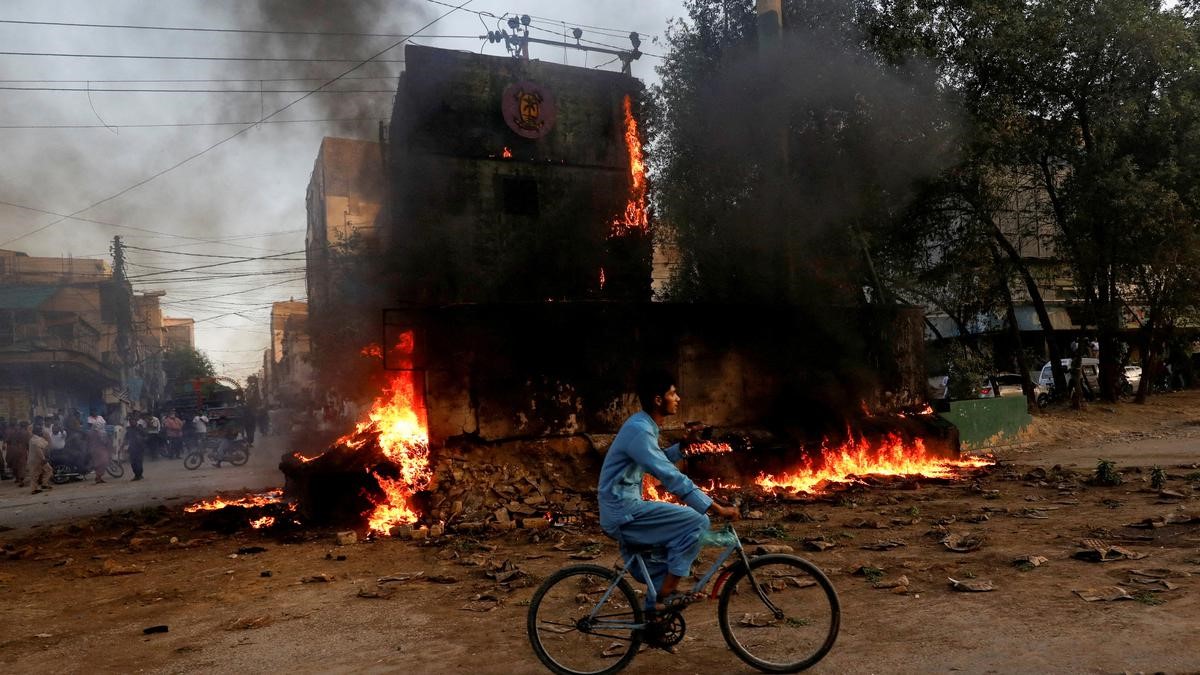
A fire set by Imran Khan’s supporters after his arrest in Karachi on 9 May this year[59]
Pakistan also has to deal with a perennial political crisis: in May 2023, former Prime Minister Imran Khan, leader of the Pakistan Tehreek-e-Insaf (PTI) party and in power from 2018 to 2022, was arrested. Already involved in more than a hundred court cases in the past[60] , charged this time with corruption and abuse of power together with his party leaders and sentenced to 3 years imprisonment[61] , Imran Khan defends himself by talking about conspiracy by the high ranks of the army[62] . The arrest provoked demonstrations by supporters of the former premier throughout Pakistan and attacks, for the first time in history, on barracks and military bases: the citizens consider the current premier, Shahabaz Sharif of the Muslim League Party, to be a hostage of the military. Now Pakistan is without a government, and there is the prospect of postponing the elections, which should be held next October[63] .
In the background is a very serious economic crisis, the result of an incompetent and corrupt establishment[64] , last year’s disastrous floods, and an economy that has been managed for too long with wicked actions[65] that force the country to continually request aid from the International Monetary Fund (Pakistan is currently fifth on the list of countries with the highest IMF loans, and with the next loan coming in it will move up to fourth[66] ). These are loans that it is unable to honour, thus compromising its credit reputation. Consumer prices are currently at an all-time high and the prospects of default are becoming more and more concrete. The search for aid extends to the Gulf Arabs, but especially to the Chinese, who hold 20 per cent of Islamabad’s foreign debt.
Yet, despite the difficulties, Pakistan’s Finance Minister Muhammad Ishaq Dar announces a defence budget for this year that will be over USD 6 billion), a nominal increase of 19.5% over the previous year[67] . It is unthinkable to hope for the opposite, the army is a gigantic machine around which the country’s entire existence revolves, it has consolidated ramifications in every sector and a turnover of almost 30 billion dollars: an element that adds to the complex puzzle, where hopes for a change of course are practically nil. The Pakistanis are not in a position to deal with their own troubles, to imagine that they have the time and the will to deal with Belucistan, if not to sell their territory to the Chinese, seems difficult.
In this bleak picture, even China’s Silk Road project, the only real prospect for economic recovery, is imploding due to the Chinese crisis and Islamabad’s management incapacity: but it is the blind power politics, aimed at managing the country’s security, that are the real explosive. Should a civil war start in Pakistan, Belucistan, paradoxically, would have a card to play on the great table of international diplomacy – to which, so far, no one has given a seat to speak. In this sense, certain openings on the part of Saudi Arabia, which is certainly pleased to see the Belucistan case become a thorn in the side for Tehran as well, are to be valued.
In this discussion, which is crucial for future economic, military and diplomatic arrangements, the European Union is completely absent. It seems that we Westerners only know one strategy with the rest of the world: subjugate it as a colony or forget about it altogether.
[1] Sir Waltter Raleigh, ‘A Discourse of the Invention of Ships, Anchors, Compasse, & co.’, TW, London 1650; https://www.oxfordreference.com/display/10.1093/acref/9780191843730.001.0001/q-oro-ed5-00008718;jsessionid=01B2EB0115E1F06392E0F941D7ACE53B
[2] https://carnegieendowment.org/2013/04/11/balochistan-state-versus-nation-pub-51488
[3] https://www.amistades.info/post/balucistan-insorgente-dall-etnonazionalismo-alla-controinsorgenza
[4] https://organiser.org/2023/01/31/106809/world/baloch-people-running-out-of-patience/
[5] https://www.amistades.info/post/balucistan-insorgente-dall-etnonazionalismo-alla-controinsorgenza
[6] https://30mq.wordpress.com/2020/06/29/iran-la-minoranza-etnica-del-baluchistan-e-i-diritti-umani-dimenticati-allombra-della-one-belt-one-road-in-pakistan/
[7] https://islamabadpost.com.pk/balochistan-population-touches-21-7-million-mark/
[8] https://www.aninews.in/news/world/asia/geopolitical-importance-of-indian-ocean20230328143551/
[9] https://www.undp.org/pakistan/projects/balochistan-sdgs-bsdg-accelerated-delivery
[10] https://organiser.org/2023/01/31/106809/world/baloch-people-running-out-of-patience/
[11] https://jhs.bzu.edu.pk/upload/VOl%20II-19_5.%20Sandeman%20System%20and%20the%20Murri,%20Bugti%20Tribes%20of%20Balochistan.pdf_41.pdf
[12] https://www.britannica.com/topic/Indian-Independence-Act-1947
[13] https://www.pakistantoday.com.pk/2023/01/19/balochistan-is-a-black-hole-for-human-rights-violations/
[14] https://www.thegeostrata.com/balochistan-movement-timeline
[15] https://bajakhana.com.au/tag/khan-sahib-abdul-karim-khan/
[16] https://military-history.fandom.com/wiki/Prince_Karim_Khan
[17] https://military-history.fandom.com/wiki/Prince_Karim_Khan
[18] https://military-history.fandom.com/wiki/Prince_Karim_Khan
[19] https://www.iar-gwu.org/print-archive/8er0x982v5pj129srhre98ex6u8v8n
[20] https://military-history.fandom.com/wiki/Prince_Karim_Khan
[21] https://gandhara.rferl.org/a/pakistanis-remember-military-coup-two-decades-on-as-opposition-still-struggles-against-its-dominance/30889436.html
[22] https://www.iar-gwu.org/print-archive/8er0x982v5pj129srhre98ex6u8v8n
[23] https://pakpips.com/web/wp-content/uploads/2017/11/sr2009.pdf
[24] https://pakpips.com/web/wp-content/uploads/2017/11/sr2010.pdf
[25] https://www.aljazeera.com/news/2022/4/28/pakistan-woman-suicide-bomber-change-in-baloch-rebels-strategy
[26] https://www.theguardian.com/world/2022/apr/26/female-suicide-bomber-near-china-institute-pakistan
[27] https://www.reuters.com/world/asia-pacific/pakistan-insurgents-claim-downing-army-helicopter-killing-six-2022-08-03/
[28] https://thebalochistanpost.net/2022/12/balochistan-multiple-attacks-on-security-forces-bla-claims-responsibility/
[29] https://www.dawn.com/news/1728306
[30] https://www.rewariyasat.com/national/history-of-balochistan-how-balochistan-liberation-army-was-form-to-liberate-balochistan-from-pakistan-know-history-88175?infinitescroll=1
[31] https://www.aljazeera.com/news/2023/1/20/blast-derails-passenger-train-in-pakistans-balochistan-report
[32] https://www.bbc.com/news/world-asia-64859397
[33] https://www.aljazeera.com/news/2023/4/10/deadly-blast-hits-police-vehicle-in-pakistans-quetta-official
[34] https://www.youtube.com/watch?v=22U1r_5nsPk
[35] https://www.hindustantimes.com/videos/world-news/balochistan-powerful-blast-hits-pak-police-car-during-suicide-bomb-attack-watch-cctv-footage-101688295662244.html
[36] https://edition.cnn.com/2023/01/31/asia/pakistan-peshawar-mosque-blast-tuesday-intl-hnk/index.html
[37] https://www.aljazeera.com/news/2022/11/28/pakistan-taliban-ends-ceasefire-with-govt-threatens-new-attacks
[38] https://www.indianarrative.com/opinion-news/are-baloch-and-pashtun-rebels-now-working-together-against-the-pakistani-state-88794.html
[39] https://www.satp.org/terrorist-groups/pakistan
[40] https://www.voanews.com/a/pakistan-suffers-record-terror-related-deaths-afghanistan-registers-58-drop/7004410.html
[41] https://www.voanews.com/a/pakistan-suffers-record-terror-related-deaths-afghanistan-registers-58-drop/7004410.html
[42] https://www.brecorder.com/news/403842
[43] https://www.iar-gwu.org/print-archive/8er0x982v5pj129srhre98ex6u8v8n
[45] https://www.geopolitica.info/china-pakistan-economic-corridor/
[46] https://www.cfr.org/backgrounder/china-xinjiang-uyghurs-muslims-repression-genocide-human-rights
[47] https://thediplomat.com/2017/06/whats-happening-at-pakistans-gwadar-port/
[48] https://www.brecorder.com/news/399768
[49] https://www.indiatoday.in/world/story/balochistan-bombing-behind-raging-insurgency-pakistan-2343223-2023-03-06
[50] https://www.geopolitica.info/china-pakistan-economic-corridor/
[51] https://iari.site/2023/03/15/il-triangolo-cina-india-pakistan-tra-equilibrio-e-frizioni/
[52] https://thediplomat.com/2017/06/whats-happening-at-pakistans-gwadar-port/
[53] https://online.ucpress.edu/as/issue/49/6 Khan, Adeel ‘Renewed Ethnonationalist Insurgency in Balochistan, Pakistan’ – 2009
[54] https://www.pipeline-journal.net/news/pakistan-and-turkmenistan-sign-joint-implementation-plan-tapi-gas-pipeline-project
[55] https://economictimes.indiatimes.com/news/defence/pakistan-army-general-admits-chinas-role-in-crushing-baloch-freedom-movement/articleshow/80610882.cms ; https://economictimes.indiatimes.com/news/defence/chinese-drones-helping-pak-army-curb-dissent-in-balochistan-protect-its-investments/articleshow/96441823.cms
[56] https://mondoeconomico.eu/planisfero/pakistan-esercito-pachistano-imran-khan-india-cina
[57] https://balochwarna.com/2023/04/05/why-balochistan-should-be-an-independent-country/
[58] https://hir.harvard.edu/the-past-has-yet-to-leave-the-present-genocide-in-bangladesh/
[59] https://www.thehindu.com/news/international/explained-the-calm-after-the-storm-for-pakistan/article67035198.ece
[60] https://it.euronews.com/2023/08/10/pakistan-sciolto-il-parlamento-si-profila-un-rinvio-delle-elezioni
[61] https://it.euronews.com/2023/08/10/pakistan-sciolto-il-parlamento-si-profila-un-rinvio-delle-elezioni
[62] https://www.aljazeera.com/news/2023/8/10/did-us-ask-for-imran-khans-removal-as-pakistan-pm-after-he-visited-russia
[63] https://www.voanews.com/a/pakistan-s-now-dissolved-parliament-blamed-for-boosting-military-intrusion-in-politics/7220022.html
[64] https://www.ndtv.com/world-news/imran-khans-corruption-bad-governance-cause-of-economic-malaise-pakistan-pm-4234932 ; https://tradingeconomics.com/pakistan/corruption-rank
[65] https://www.bbc.com/news/business-66062429
[66] https://timesofindia.indiatimes.com/world/pakistan/pakistan-set-to-become-4th-biggest-imf-debtor-report/articleshow/101452107.cms?from=mdr
[67] https://www.janes.com/defence-news/news-detail/pakistans-defence-budget-rises-but-inflation-nullifies-gains
Leave a Reply